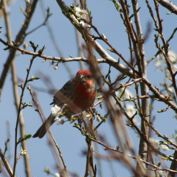The Listeners
‘Is there anybody there?’ said the Traveller,
Knocking on the moonlit door;
And his horse in the silence champed the grasses
Of the forest’s ferny floor:
And a bird flew up out of the turret,
Above the Traveller’s head
And he smote upon the door again a second time;
‘Is there anybody there?’ he said.
But no one descended to the Traveller;
No head from the leaf-fringed sill
Leaned over and looked into his grey eyes,
Where he stood perplexed and still.
But only a host of phantom listeners
That dwelt in the lone house then
Stood listening in the quiet of the moonlight
To that voice from the world of men:
Stood thronging the faint moonbeams on the dark stair,
That goes down to the empty hall,
Hearkening in an air stirred and shaken
By the lonely Traveller’s call.
And he felt in his heart their strangeness,
Their stillness answering his cry,
While his horse moved, cropping the dark turf,
‘Neath the starred and leafy sky;
For he suddenly smote on the door, even
Louder, and lifted his head:-
‘Tell them I came, and no one answered,
That I kept my word,’ he said.
Never the least stir made the listeners,
Though every word he spake
Fell echoing through the shadowiness of the still house
From the one man left awake:
Ay, they heard his foot upon the stirrup,
And the sound of iron on stone,
And how the silence surged softly backward,
When the plunging hoofs were gone.
Once again we encounter in a poem the familiar underpinnings of distorted time. This time however, it is the subject rather than the reader who is trapped in the misperception.
The subject of the poem, the Traveler, is re-visiting the people who lived in this old an isolated residence, because he promised before his departure to come back. But when he finally returns there is no longer anyone there.
It would seem that many years have transpired between the making of his promise and the keeping of it – years in which the deserted house has fallen to wrack and ruin, and its occupants long since passed away.
Astronomers tell us that objects with immense mass have the ability to warp the space time continuum, such that if for instance one were to get close enough to a black hole just this side of its event horizon, that time would be critically slowed down. The person returning back to earth from such a visit will have found that thousands of years have ticked away in the course of his own lifetime.
We must suppose that some matter of great weight drew the Traveler away from the life he shared with ‘The Listeners’, and ‘Time’ got away from him.
The Traveler returns to ‘keep his word’ he seems to have forgotten – or not to have realised that many years have gone by. We get the feeling that the fate which befell the listeners was a result of his neglection of them.
Of course a man might like to fancy himself as being so esteemed that a woman might patiently wait for him even as the years and decades rolled by on the strength of the perhaps lightly given promise of his return with all the expected consequent rejoicing etc, and if he failed to keep his word that she and would wither and pine away in his absence like old Miss Havisham in Dickens’ “Great Expectations’.
But when I remember the effect this poem first had on my mind, and my inability to forget it, I can easily bring myself to set aside my cynical thoughts and moral scrupulosities. I remember the questions with which my mind seethed – Were ‘The Listeners’ the man’s kith and kin? or the family of his bethrothed? Did he leave for places far away to make his fortune, and when he had, did he then return thinking to resume his life where he left it ?
We don’t know, and so we must guess at the fate which befell ‘The Listeners”, and whatever may have happened to their hopes and dreams and loves while they waited patiently – or not – for the Traveler’s return. De la Mare allusive offering suggests that they returned in sad passivity to the dust from which their creator fashioned them.
But then again, I wonder, perhaps ‘The Listeners’, whom we might suppose to have been the traveler’s betrothed and her family had a story with a different ending….
Perhaps, when the Traveler did not return as expected, or even ever send a postcard, she – and if we wish we could even rescue her form the anonymity to which she was consigned by De la Mare and return to her her rightful name of Eugenia -– decided rather than spending the shrinking remainder of the family fortune on repairs and renovations of the old manor, that it was best for her and her small family of two loving parents (William Henry and Emilia Sophia) and and a sister and brother, (Clara and Frederick) to leave their old home and set off for a more promising destination -– such as Canada – where land was cheap and wheat grew well. Either that, or go New Zealand, where fortunes could be made in sheep and cattle, or even Ceylon, where a tea estate in the mountains could be had for an affordable if not modest sum, and a leisurely contented life could be attained without much effort at all….










